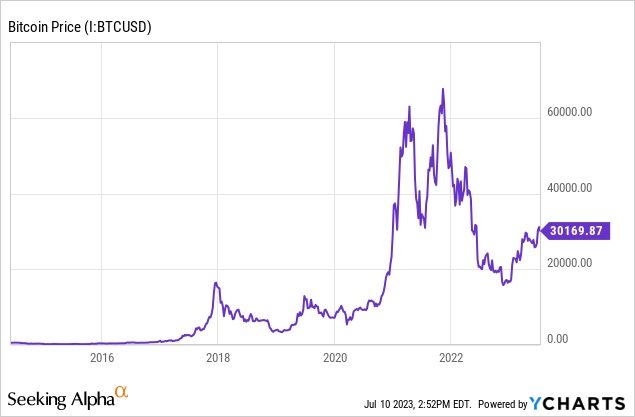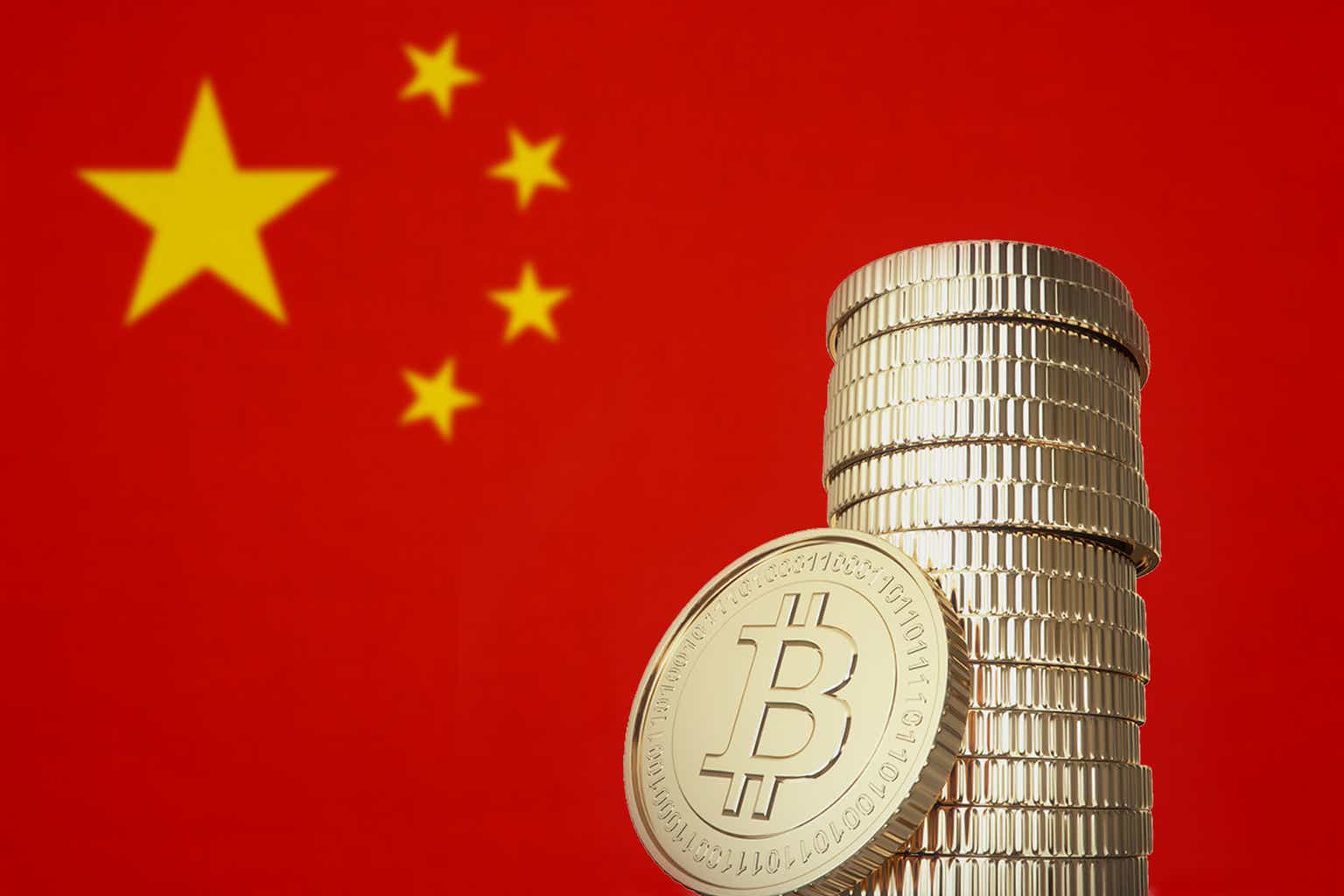This article was originally published for members of Beat Billions. Price data was updated on July 10.
As some of you know, I have mixed views about cryptocurrencies. I am generally bullish on cryptocurrencies but at the same time, I have no clarity as to which individual cryptocurrency will go on to make it big. For now, investors wanting to gain exposure to this technology might have to settle for Bitcoin (BTC-USD), which is the largest cryptocurrency today. I consider Coinbase Global, Inc. (COIN) stock as a reliable alternative to cryptos to gain exposure to digital assets since the company can thrive in the long run regardless of which cryptocurrency makes it big.
Although I am more of a long-term stock investor and less of a trader who tries to make the most of short-term macroeconomic developments, I believe there is no harm in following such trends to see whether an opportunity will come my way. After monitoring some recent developments in China – a country that has gone to extreme lengths to curb the adoption of this technology – I have a feeling that crypto prices may surprisingly benefit from favorable policy decisions in China.
China’s Changing Stance On Cryptocurrencies
China has had a tumultuous relationship with cryptocurrencies, frequently cracking down on them. During the crypto bull market in 2017, Chinese authorities took action against crypto trading, particularly focusing on Initial Coin Offerings. The trading of digital assets is prone to scams due to a lack of regulation. To address the growing concerns surrounding cryptocurrencies, China implemented a ban on all platforms offering them, requiring exchanges to refund investors’ money. In 2021, the Chinese State Council implemented its strictest crypto trading and mining ban to date, forcing out all Bitcoin, Ethereum, and crypto miners. The ban resulted in more than a 50% drop in Bitcoin’s network hash rate and a significant decline in Bitcoin price in the subsequent months.
Bitcoin price chart

In addition to the ban on Bitcoin mining, Chinese regulatory bodies outlawed all crypto trading and transactions, making it illegal for residents to send or receive cryptocurrencies. Meanwhile, China actively pursued the development of an official Central Bank Digital Currency, known as the “digital yuan,” and cities like Shanghai committed substantial investments to national metaverse projects.
On the other hand, Hong Kong has taken a different approach by recently adopting a new crypto licensing regime that will allow the trading of established cryptocurrencies starting from June 1. The move requires trading platforms and exchanges to obtain licenses or face fines and jail terms. The Securities and Futures Commission of Hong Kong has stated that the majority of respondents agreed to the proposal to allow licensed trading platform operators to serve retail investors. The Commission plans to implement measures to protect investors, including ensuring suitability in the onboarding process, good governance, enhanced token due diligence, admission criteria, and disclosures. This change in Hong Kong’s regulatory landscape suggests a willingness to embrace the potential benefits of cryptocurrencies.
I believe China will use Hong Kong as a testing ground to see what works and develop a path for the country to gradually open up to cryptocurrencies in the coming years.
China’s Web3 Innovation and Development White Paper
China’s release of the “Web3 Innovation and Development White Paper (2023)” signifies the government’s focus on fostering innovation and development within the web3 industry. The white paper identifies key research areas, such as Artificial Intelligence, XR interactive terminals, and content production tools. It acknowledges the rapid growth of emerging applications like digital populations and collections. However, the paper also highlights the challenges in terms of technology and talent support capabilities, industrial chain integrity, and legal norms. To address these challenges, the Beijing Municipal Science & Technology Commission plans to allocate significant funding to drive innovation in the web3 industry.
Yang Hongfu, the director of the Zhongguancun Chaoyang Park management committee, revealed that the Chaoyang district of the city has committed to allocating a minimum of 100 million yuan ($14 million) per year until 2025 for this cause. This investment pledge underscores the pivotal role of Zhongguancun, often referred to as China’s Silicon Valley, in propelling this ambitious initiative forward.
The release of the white paper, alongside the changing crypto regulations in Hong Kong, has sparked reactions and speculation about China’s shifting perspective on cryptocurrencies. Binance CEO Changpeng Zhao expressed intrigue, noting that historically, similar coverage by China Central Television has been associated with heightened market activity and price surges. The CCTV recently featured a Bitcoin ATM in Hong Kong, with a conspicuous blue Bitcoin logo and the option to “Buy Bitcoins,” suggesting a potential change in China’s stance.
Despite China’s past crackdown on digital assets, the digital assets market has shown resilience. Bitcoin, which experienced a significant shock due to the mining ban more than two years ago, has rebounded but continues to trade around $30,000, weighed down by macroeconomic factors. The recent positive risk sentiment resulting from the debt-ceiling deal in the United States has contributed to an improvement in the market sentiment toward cryptocurrencies, and Bitcoin has gained just over 10% since publishing this article to Beat Billions members.
What Does China’s Changing Stance Mean To Crypto Markets?
The ban imposed by China in 2021 had a notable impact on the global crypto industry, however, the ban did not entirely halt crypto-related activities within China. Underground crypto markets emerged as enthusiasts sought ways to circumvent the regulations. The crackdown was part of a broader effort to regulate the fintech sector and aligned with China’s ambitions to introduce its own digital currency, the digital yuan. The indication of a potential shift in China’s approach to cryptocurrency regulation is a significant development. Market participants are closely monitoring the signs of a possible shift in China’s position, although the specifics and implications of this potential change remain uncertain. If China were to lift its ban on cryptocurrencies, it would undoubtedly have a substantial impact on the global crypto market as it was once the world’s dominant Bitcoin mining hub. China’s potential acceptance of cryptocurrencies could stimulate global demand, drive up prices, and potentially contribute to wider acceptance of digital currencies.
Takeaway
China’s evolving stance on cryptocurrencies, as reflected in the release of a white paper and changing crypto regulations in Hong Kong, has sparked speculation about the potential for a new Bitcoin bull run. The combination of regulatory developments and positive risk sentiment in global markets could attract traders back to the crypto market and trigger significant price surges. As the crypto sector continues to evolve, it will be essential to monitor China’s policy shifts and their impact on the broader market. To make the most of a positive shift in the Chinese regulatory landscape, we will monitor the activities of some of China’s prominent regulatory bodies.
Read the full article here





